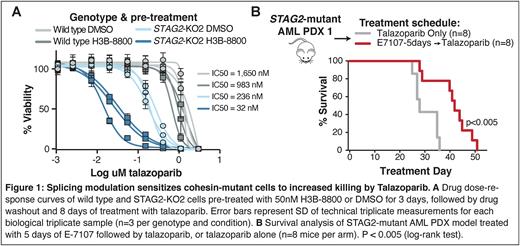Abstract
Cohesin is a multi-subunit protein complex that is essential for sister chromatid cohesion, three-dimensional chromosome organization and gene regulation. Genes encoding components of the cohesin complex, most commonly STAG2, are frequently mutated in cancer, including 15-25% of cases of myelodysplastic syndromes MDS and secondary acute myeloid leukemia (sAML). Cohesin mutations are associated with poor overall survival and there are currently no targeted therapies available for patients with cohesin-mutant cancers. Modulation of RNA splicing with SF3B1-targeting drugs has shown efficacy in splicing-factor mutant MDS, but its use outside of this context is unknown. Prompted by our observations that SF3B1-mutations and STAG2-mutations tend not to co-occur in MDS patients and that that SF3B1-mutant cells depend on STAG2 for survival, we sought to determine the effects of SF3B1 splicing modulators on cohesin-mutant cells.
First, we tested sensitivity of isogenic U937 cell lines engineered with different cohesin mutations to the SF3B1 modulators H3B-8800 and E-7107. STAG2- mutant cells showed increased sensitivity to both drugs and were out-competed by wild-type cells when treated with H3B-8800 both in vitro and in vivo. To understand the mechanism mediating the killing of cohesin-mutant cells, we quantified alternative splicing in cells treated with H3B-8800 relative to DMSO-treated controls. We identified widespread mis-splicing and corresponding reduced gene expression of DNA repair genes, including BRCA1 and BRCA2, whose mis-splicing led to complete loss of protein expression in cells.
Cohesin mutant cells accumulate DNA damage and have increased reliance on proper DNA repair for survival. We therefore hypothesized that short-term treatment with SF3B1-targeting drugs could sensitize cohesin-mutant cells to DNA damage repair inhibitors, such as PARP inhibitors and chemotherapy. We tested this hypothesis using sequential treatment of isogenic cell lines and STAG2-mutant PDX models of AML with H3B-8800 and DNA repair inhibitors. Pre-treatment of cohesin-mutant cells with H3B-8800 for 3 days increased their sensitivity to the PARP inhibitor talazoparib 10-fold, while the sensitivity of wild-type cells to talazoparib was unaffected (Figure 1A). In addition, pre-treatment of mice with 5 days of E-7107 followed by talazoparib extended overall survival of multiple STAG2-mutant AML PDX models compared to talazoparib treatment alone (Figure 1B). In addition to talazoparib, we demonstrated significantly improved overall survival of STAG2-mutant AML PDX mice receiving sequential treatment of E-7107 and standard induction chemotherapy (doxorubicin and cytarabine), further expanding this strategy beyond PARP inhibitors.
Finally, we validated the effects of SF3B1 splicing modulators on mis-splicing of DNA damage repair genes in a set of blood samples isolated from MDS/sAML patients enrolled in the Phase 1 trial with H3B-8800 (NCT02841540). We performed RNA-Seq immediately prior, and 2-4 hours post- treatment with H3B-8800 in three patients. We found a remarkable conservation at the event-level of the H3B-8800-induced mis-spliced targets as were observed in our cell line and PDX models, as well as the same trend for downregulation of DNA repair genes. This result suggests that H3B-8800 targets mis-splicing of DNA repair genes in primary MDS/sAML patients, and that sequential treatment with H3B-8800 and chemotherapeutic agents in vivo may provide additional therapeutic benefit to patients with cohesin-mutations.
In summary, our study identifies a critical connection between cohesin mutations and splicing modulation in AML, creating a novel therapeutic strategy for these patients with very limited treatment options and poor outcomes. Our findings not only expand the potential therapeutic benefits of SF3B1 splicing modulators to include cohesin-mutant MDS/sAML but we also propose this as a broader strategy for therapeutic targeting of other DNA damage-repair deficient cancers.
Disclosures
Abdel-Wahab:H3B Biomedicine, Foundation Medicine Inc, Merck, Prelude Therapeutics, and Janssen: Consultancy; H3B Biomedicine, LOXO Oncology, and Nurix Therapeutics: Research Funding; Envisagenics Inc., AIChemy, Harmonic Discovery Inc., and Pfizer Boulder: Membership on an entity's Board of Directors or advisory committees. Taylor:Karyopharm, Inc: Honoraria. Seiler:Remix Therapeutics: Current Employment. Buonamici:Monte Rose Therapeutics: Current Employment. Adelman:CAMP4 Therapeutics: Membership on an entity's Board of Directors or advisory committees; Syros Pharmaceuticals: Consultancy.
Author notes
Asterisk with author names denotes non-ASH members.


This feature is available to Subscribers Only
Sign In or Create an Account Close Modal